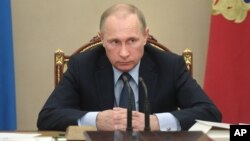Moscow has protested the seizure of Russian government assets in France and Belgium - a move taken to enforce a multi-billion-dollar judgment in a lawsuit filed by shareholders of Yukos, the now-defunct Russian oil company founded by tycoon-turned-dissident Mikhail Khodorkovsky.
Last July, the Permanent Court for Arbitration in The Hague ordered Russia to pay $50 billion to former Yukos shareholders, including Khodorkovsky, who charged that the government had used tax claims to destroy the company.
Russia's Foreign Ministry said in a statement Thursday that it summoned Belgium's ambassador in Moscow (Alex Van Meeuwen) Tuesday to protest the seizure of accounts belonging to the Russian embassy in Belgium, Russia's representative offices at the European Union and NATO in Brussels, and "a number of other Russian organizations in Belgium."
The ministry demanded Brussels "take immediate measures to restore the Russian Federation's sovereign rights" and guarantee the normal operation of Russian institutions and legal entities in Belgium, or possibly face "appropriate retaliatory measures" against Belgian property in Russia, including that belonging to its embassy in Moscow.
Russian media reported that 47 Belgian and Russian enterprises registered in the Brussels region were notified Wednesday that they must submit a list of Russian assets in their possession within 15 days.
Tim Osborne, the director of GML, a holding company created by the five major shareholders in Yukos, told the French news agency Thursday that accounts in around 40 banks and "eight or nine buildings" in France had been frozen.
Russian Economic Development Minister Alexei Ulyukayev said Thursday the amount of Russians funds frozen in France and Belgium was "insignificant," but that his government considered the seizures illegal and would challenge them. He and other Russian officials indicated that similar action against Moscow was likely elsewhere.
Khodorkovsky was arrested in 2003, after which Yukos was broken up and sold off, with the state oil company Rosneft acquiring most of its assets.
The former tycoon, who was released from prison in December 2013 after serving 10 years, said via a Russian social network (VKontakte) Thursday that he was "glad" about "seizure of the property of our (Russian state) bureaucracy in Belgium" and expected to see the money from those assets go towards "projects useful to Russian society."




